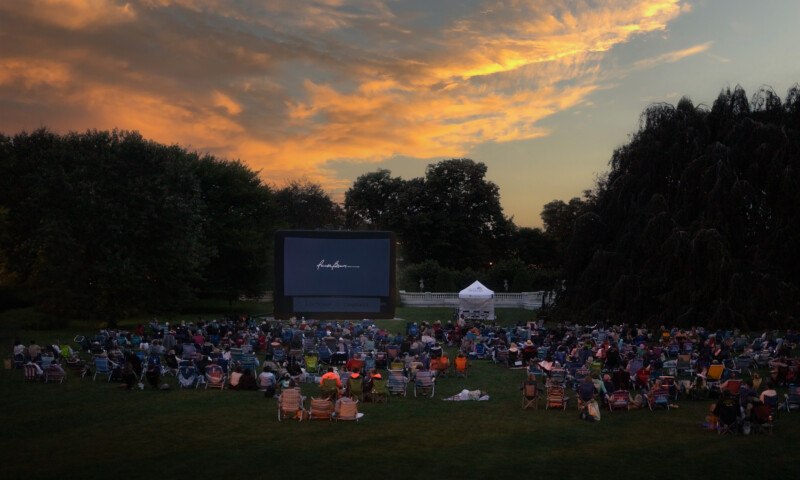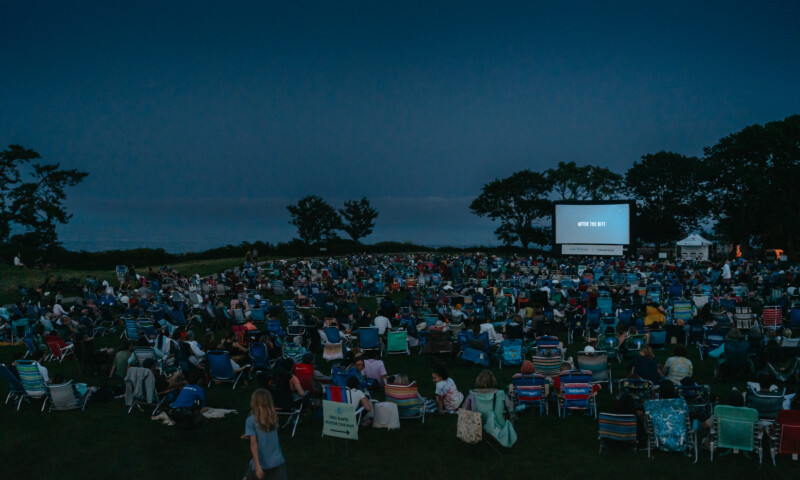
NEWPORT, R.I. — One of Aquidneck Island’s long-running outdoor events is working to divert waste from the landfill — and has diverted more than 73% of its waste so far this year.
According to organizers of newportFILM, a nonprofit dedicated to screening documentary films in the East Bay area year-round, the weekly summer event series has generated 132 pounds of compost, 112 pounds of recycling and 82 pounds of trash.
It’s the first year newportFILM has committed to having zero waste from its events.
“We’ve always had a carry-in, carry-out policy for our outdoor events,” said Jessica Walsh, director of marketing and partnerships. “We’re always looking for new green initiatives.”
Every year, newportFILM runs an outdoor screening series, rotating the documentaries it screens and the historic sites at which it screens them. Attendees this year have watched documentaries about skateboarder Tony Hawk at Fort Adams, a fashion designer icon at Rosecliff, and tennis legend John McEnroe at (appropriately) the International Tennis Hall of Fame.
Between 30 and 40 volunteers help at events during the summer season. Five of those volunteers are committed to the event’s green team and monitor the three-bin zero-waste stations across the venue, educating attendees on where their trash goes. The crowd size for every event can vary, from 400 in some of the smaller venues to more than 1,000 at some of the largest ones.
Every screening has multiple sets of the same three bins: one for trash, one for recycling glass and cardboard materials, and one for compostable food waste. Members of the green team collect up to 15 pounds of compostable waste per event.
It’s not the first time Clean Ocean Access has worked on event sustainability with another organization on Aquidneck Island. Last summer it worked with the International Tennis Hall of Fame to help the eight-day Hall of Fame Open reduce single-use plastic and achieve a goal of 75% waste diversion.
Hall of Fame sponsorship manager Haley Swan said at a Clean Ocean Access symposium in January the zero-waste efforts were well-received by event attendees.
“We diverted 470 pounds of compostable waste from the landfill,” said Swan. “On the single-use plastics front we eliminated all plastic utensils, food containers and straws from concession and replaced them with compostable alternatives.”
Clean Ocean Access’ Healthy Seas, Healthy Soils campaign has diverted 3,600,600 pounds of food scraps from the landfill over the last four years, primarily through its residential and commercial collection arms.
The Rhode Island Resource Recovery Corporation estimates 100,000 tons of food is buried in the Central Landfill in Johnston every year. Nationwide, the U.S. Department of Agriculture estimates one third of all food produced for human consumption is either lost or wasted, equaling around 35 million tons.
U.S. food loss and waste accounts for 170 million metric tons of carbon dioxide equivalent greenhouse gas emissions, equal to the same amount of emissions from 42 coal-powered power plants, not including the unknown amounts of methane emitted by the waste.
Composting keeps food waste out of landfills and reduces greenhouse gas emissions. Finished compost recycles vital nutrients back into the soil to improve its overall health. Healthy soil expands its ability to store carbon and reduce the need for chemical fertilizers and pesticides, which can seep into local water bodies or supplies from stormwater runoff.
Food diversion would also temporarily expand the life of the Central Landfill, which is estimated to reach capacity by 2040.
newportFILM plans to continue its waste diversion program at its indoor series this fall and beyond. Walsh noted that zero-waste policies received significant support on the organization’s latest survey.
“It’s amazing how thankful people are for this,” said Walsh.



